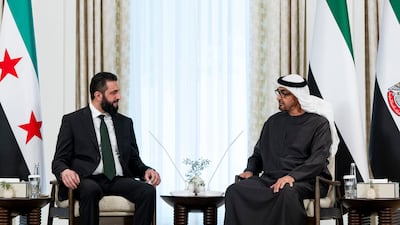Sunday’s official visit by Syrian President Ahmad Al Shara to Abu Dhabi, where he was welcomed by UAE President Sheikh Mohamed and leading Emirati officials, is a reflection of the profound changes that have taken place since the fall of the Bashar Al Assad government in December.
Mr Al Shara, whose Hayat Tahrir Al Sham insurgents played a leading part in Mr Al Assad’s removal, was making his first trip to an Arab country since forming a new Syrian government last month. His meeting at the capital’s Al Shati Palace was a consequential step forward on the journey to build a better future for Syria’s people.
Sheikh Mohamed’s statement that the UAE would "spare no effort in providing all possible support to Syria" points to the substantive issues accompanying Mr Al Shara’s visit. In essence, Syria – with its myriad challenges – is a national project that urgently needs regional and international support. Renewing connections with Arab partners such as the UAE is key to this project’s success.
But the task of helping Syria’s leaders restore the country’s security and stability should not fall to the Arab world alone. Syria remains under strict western sanctions that make restarting its economy difficult. For the Syrian project to succeed, its citizens need jobs, services and the ability to buy and sell with a stable currency. A government that has been in power for a matter of weeks cannot provide answers to all these issues, particularly with one arm tied behind its back.
Although the EU has lifted some restrictions, allowing local banks to move money around, broad US sanctions under the Caesar Act prevent many companies from investing in Syria’s reconstruction or its important oil and gas sector. US President Donald Trump has also subjected Syria to a tariff of 41 per cent, a move that makes economic recovery even more difficult. A more coherent policy direction from the West – backing up its avowed support for Syrian stability by empowering the country’s economy – would help to steady Syria on its road to becoming master of its own destiny once more.
During Sunday’s meeting of the UAE and Syrian leaders, Sheikh Mohamed noted the security and stability of Syria is important to the entire Middle East. Worryingly, that stability is under threat. Aside from Syria’s economic challenges, the continued presence of Israeli troops in its territory, tensions on the borders with Jordan and Lebanon, the continuing struggle to crack down on the trade in illegal drugs and the scourge of sectarian violence all pose grave risks not only to Syria's cohesion but to the country’s neighbours.
For security to be given a chance to take root, rebuilding connections between Syria and the Arab world is vital. Mr Al Shara’s visit took place during a time of rejuvenated diplomacy in the Middle East and is his fourth visit to an Arab country. Although Syria has a long way to go before it truly gets back on its feet, as Sunday’s meeting showed there is a warm welcome in the UAE for those working in the Syrian people’s best interests.


